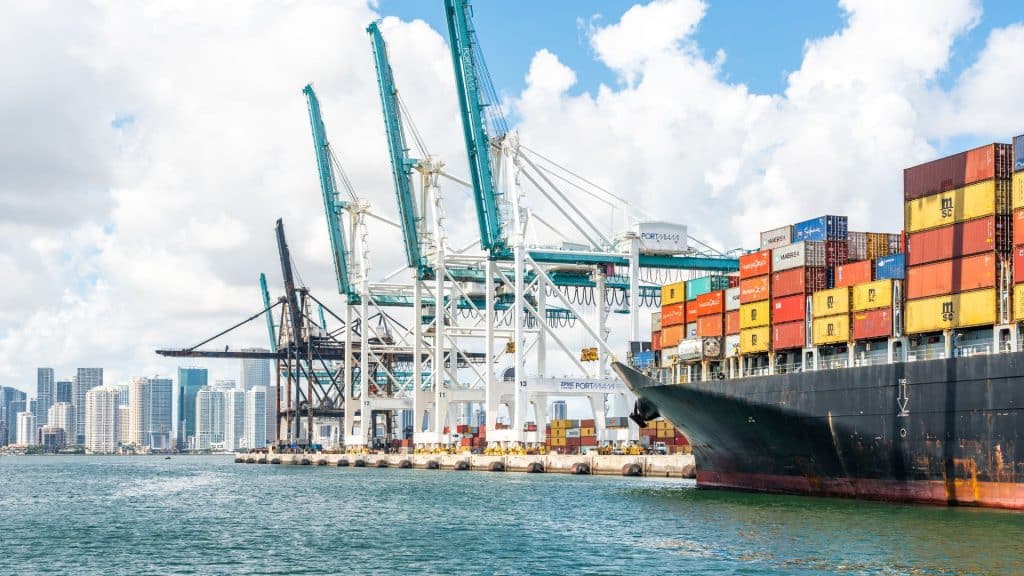HOUTHIS VOW TO EXTEND ATTACKS DEEPER INTO THE INDIAN OCEAN
Another ship has been damaged by the Houthis, who now claim to have hypersonic missiles in their armoury and will expand their target zone deeper into the Indian Ocean to try and prevent enemy vessels from passing via the Cape of Good Hope. To date, in their five-month campaign in solidarity with Hamas, the Houthis from Yemen have focused their attacks on more than 65 ships to the Red Sea and the Gulf of Aden, with some two-thirds of all marine traffic between Asia and Europe now avoiding the area and heading around the continent of Africa instead. The leader of Yemen’s Houthis, Abdul Malik al-Houthi, said in a televised address yesterday the group’s operations targeting vessels will escalate to prevent Israel-linked ships from passing through the Indian Ocean towards the Cape of Good Hope.
CHINESE LINER READIES TRANSPACIFIC ENTRY
A new Chinese entrant is ready to enter the transpacific container trades. Hong Kong-based Hede (Hong Kong) International Shipping, part of Tangshan Port Industrial Group, will deploy two 4,250 teu ships later this month on a new service linking Shanghai and Los Angeles. Previously the shipping line focused on domestic trades with a small sideline connecting with Japan and South Korea. During the pandemic many new entrants launched services across the Pacific, but most have since faded from view with global liners reasserting their dominant market share on the trade lane. Hede has just been classified by the US Federal Maritime Commission as a controlled carrier of the government of the People’s Republic of China and added to the agency’s-controlled carrier list whereby it will be subject to enhanced regulatory oversight by the commission.

MAERSK AIMS TO RESHAPE LOGISTICS WITH DB SCHENKER BID
The bid to buy DB Schenker is a significant change of direction by Maersk with CEO Vincent Clerc acknowledging as much in last month’s annual results call. Clerc explained that any fears of “disynergies” that the company harboured in the past are no longer applicable and so it is necessary to investigate whether a Schenker acquisition is viable. McVicar, who covered DB Schenker when the company was listed, points to the fact that Maersk does not have the managerial expertise to operate a major forwarder, which will make the carrier reliant on its existing management, but he added that this same management had expected to be able to buy the company, and McVicar speculates, that they may not be so willing to join Maersk in its odyssey. A giant deal would certainly shift the outlook for Maersk, but changing the rest of the supply chain will require Maersk to make it work.
RATE COLLAPSE WREAKS HAVOC WITH CONTAINER LINE RETURNS
Hapag-Lloyd CEO Rolf Habben Jansen said the collapse in freight rates last year was “not logical” as demand and utilisation held up and the company handled 11.9 million teu, almost exactly the same as 2022. However, revenues per teu virtually halved last year compared to the previous year’s results, seeing liner shipping returns crash during the 2023 with little hope of any respite over the next couple of years, according to Jansen. An upside for Hapag-Lloyd is that the carrier managed to stay in the black as results from the Asian carrier Yang Ming saw returns almost wiped out and Zim descended into negative territory. The deep decline in container freight has seen both Hapag-Lloyd and Yang Ming post sharp drops in annual profits, and Zim sink deeply into the red.
PANAMA CANAL ADDS BACK DAILY TRANSIT SLOTS
The Panama Canal Authority is taking further steps to ease some of the restrictions on transits imposed due to water restrictions. Starting later this month, they are increasing the available spots for daily transits by a further 12 percent after delaying planned reductions earlier in the year. Two additional slots will be offered through the auction system for transit dates beginning March 18, and an additional slot will become available for transit dates beginning March 25 for the original locks. According to the authority, these measures will allow the majority of vessels that want to transit the Panama Canal to have a better chance of obtaining a reservation. Since the start of the restrictions the authority has urged shippers to use the reservation system to elevate some of the longer waits for transit. Current data shows that the industry has adapted to the restrictions resulting in a dramatic drop in the waits as some vessels divert, and others use the reservations.